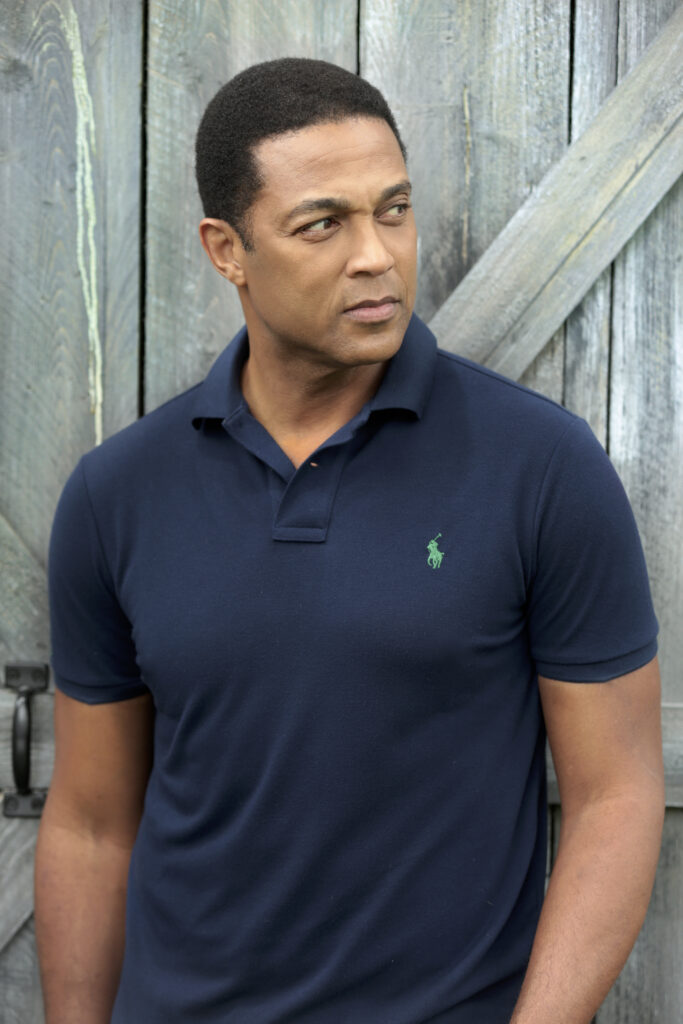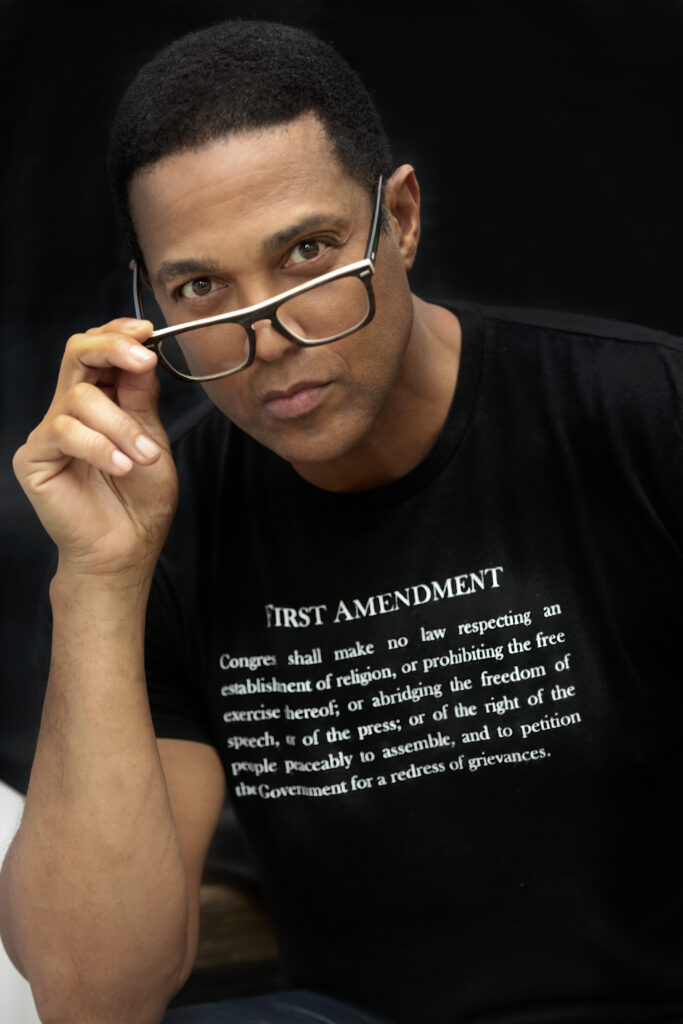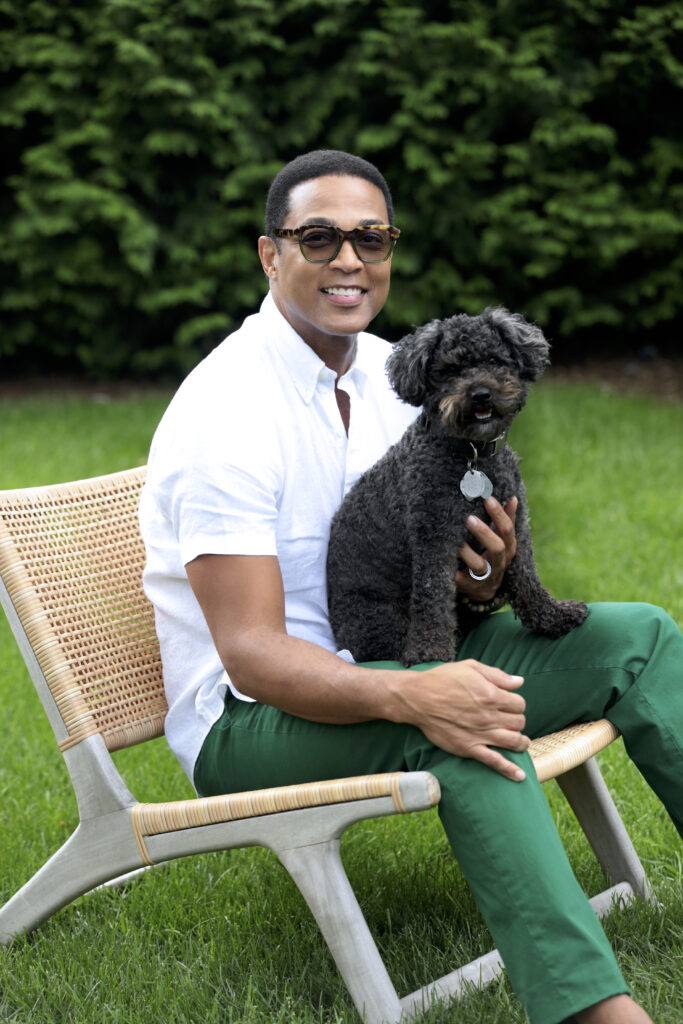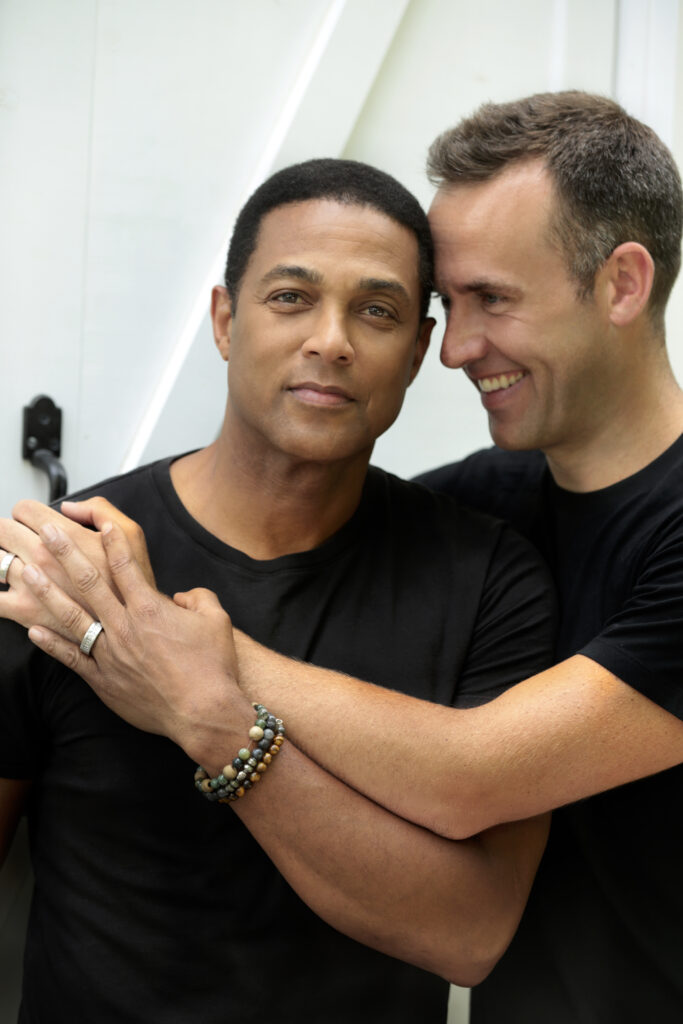
Interview by Tamron Hall • Photography by Cathrine White
It’s no time to be silent, and Don Lemon, the only black anchor on cable news during prime time, has been hitting that important message home every night through his two-hour broadcast on CNN at 10PM. As a major voice in today’s Black Lives Matter movement, Lemon has expanded his platform to include a new podcast, Silence Is Not an Option, which launched on June 15 and will examine race. His conversations with special guests will be more intimate and longer than TV news allows, and guests like Dr. Ibram X. Kendi, a historian and scholar on race and discriminatory policy, and Dr. Christopher Petrella, the director of engagement at American University’s Antiracist Research and Policy Center—who also develops the curriculum for Colin Kaepernick’s Know Your Rights Camp—are among the scholars and activists he has interviewed. His hope is to offer people at home staving off the pandemic a safe place to educate themselves and create a new intention to fight against racism, one built on equality and understanding. Here, talk-show host Tamron Hall speaks with Lemon, both from their Sag Harbor homes, about the responsibilities that come with being an American.
Tamron Hall: It’s been fantastic to watch you develop—as they say in our industry—your voice. How does that feel when someone says you’re a messenger in the room, because what you do is obviously journalism but it is with great perspective and point of view?
Don Lemon: That’s a really good question. It feels like a lot of responsibility and it feels like a lot of pressure, so I try not to think about that. Whether it is dealing with a pandemic or dealing with race, I just try to be in the moment. Everyone has a lens, and my lens is having lived in different cities growing up in the South, growing up as someone who was not wealthy. And living in both red and blue states, being around people who are both poor and rich. I try to just bring that to the table.
TH: I can’t tell you how many times I’ve heard people say, “I’m happy Don brought that up,” or “That’s exactly what I was thinking.” When you hear that, is that like a heat-seeking missile where you know you’re on the right track?
DL: I feel that I am reflecting the times that we’re in. I can lean into it because people are receptive to it, so my voice is stronger now.
TH: You have a diverse group of friends. You walk in circles that may never connect, but you are their connection. You have friends that will never meet from different walks of life, whether they’re friends from the South that you grew up with and kept in contact with, or friends in Philly or Chicago. You have many friends who are white, black and who may not get each other and you are in the middle.
DL: I have friends who are in the Deep South who are in Louisiana, very red country, with whom I went to college. And whom I’ve actually heard, when I was younger, say the N word—and even back in the ’80s when I was in college, I had to correct them. It wasn’t always a comfortable conversation. And even now I have friends who are very supportive of the president, who are big Trump supporters and I’m on text exchange with them and I still see them and I still consider them friends. I try to get them to understand the race issues, like why is it offensive when you call someone a son of a bitch because they’re trying to fight for equality or against police brutality. Sometimes you just have to let people go, because they don’t want to understand.

TH: Is it harder to explain it to your wealthy liberal friends or your friends in the rural South?
DL: It’s harder to explain it to my wealthy liberal friends because my friends in the rural South are like well, at least sometimes they say that they’re open; they are sometimes willing to understand. People in the South connect—poor people and black people. Poor white people and black people have similar experiences in the South. If you ask a poor white person would they rather be born white and poor, or black, you know what the answer will be. At least that it’s that connection. When you are fairly well-to-do, you have that shield, that protection from having to deal with people unless they’re the help. Many times it’s harder to explain to my wealthy liberal friends—because one, they’ve made up their minds that they’re not racists: “I don’t have a racist bone in my body,” which is not true of anyone. Or that “I have a black friend” or “I have black friends” or whatever. They say those things, but when you interact with them, you realize that the only person who you ever see at their home who’s black is yourself. And then you realize that no, you are not who you think you are. I think it’s sometimes harder for people who think that they are not racist or they don’t have issues to dig into more deeply than those who may think that they do, simply because they’re either in the South or because they’re poor. Do you understand what I’m saying?
TH: I think about the cable news landscape and I believe that you are the only person of color who anchors a prime-time show in cable news—does that add to the pressure of what we are talking about right now?
DL: There’s a lot of pressure, but it’s more important for me to be as real as I am and tell the truth, especially about race, because I am the expert in that field simply from living from my time on this planet and who I am.
TH: What gives you hope right now?
DL: That you and I can have a conversation like this, and you have this unique platform that you lean into that you are unapologetically black and I am unapologetically black. We do know that there are very fine people and not-very-fine people on both sides, and we have to let people know that. There’s a difference between Black Lives Matter and All Lives Matter and in this moment, you can’t run an All Lives Matter, you can’t let people get away with that—because yes, all lives do matter but this is a moment where we’re talking about blackness. There’s a conversation for that and people of all ethnicities are hurting, but this isn’t a time for All Lives Matter, because right now we are talking about race and blackness in America and this is our moment to discuss that fully and not have it sanitized or, what’s the word I’m looking for…
TH: Diluted.
DL: Diluted. This is about the black experience in America when it comes to racism, policing, criminal justice, the corporate world and so on and so forth. It should not be diluted. Let’s talk about this issue and don’t bring other issues into it. That’s how I feel.
TH: The young generation are talking much more about microaggression and macroaggression: the Amy Cooper moment in Central Park. There is a conversation happening among many people, similar to #MeToo. Little moments that have built up and now there is a sense of what someone coined the Us Too.
DL: That was me.
TH: I know that. Oh my god. You said it a year ago.
DL: I did. I said finally women have, rightfully so, had their moment when it comes to misogyny and sexism and abuse and discrimination. It’s about the #MeToo movement. And I so often wondered: When are we going to have our Us Too moment, when it comes to people of color but especially black people, because the Amy Cooper moment comes every single day. You don’t know if it’s going to come right, left or behind you or in front of you. I can point out an Amy Cooper moment in my life almost every single day of my life.
TH: Even now.
DL: Even now. There was one this weekend. I’m out on my boat coming back with my friend and this guy is trying to tell me at what speed I’m supposed to drive at in the harbor, and he cuts me off in my boat. I’m looking at my speed and I do this almost every other day, and I don’t really need you to tell me how to drive my boat.

TH: You have some people who say that guy at the harbor was being a jerk. How do you know it’s racism?
DL: Because they are being a jerk and they are being rude, but I am also with someone all the time. If I am standing with Tim, who is my partner and is white, they do not approach him. They approach me. And why do you feel that you are entitled enough to address me in that manner? Because I don’t go up to people and tell them what to do. That tells me there is something behind your effort and your actions. People need to examine that, and then once you examine that you may come to some conclusion about yourself that you may not be happy about, but you have to deal with and it’ll make you a better person.
TH: Listen, the Reverend Dr. William Barber says—and I think these words are very, very true—that if we tell our kids or if we tell ourselves that this is the worst that we’ve seen, are we doing a disservice? The world watched as Jewish people were killed, and acted in a delayed form but eventually acted. The Holocaust compelled people at some point to do something. The civil rights movement in the middle of the threats of assassination of Medgar Evers, Martin Luther King Jr., all young men. John Lewis, a child, rose up in a way that I would wonder if we could do today. Would you walk across a bridge knowing that you were going to be beaten within an inch of your life in front of TV cameras and no one cared?
DL: I would.
TH: We watched. I would like to believe we all would, but not everybody did, even then. That’s why we revere him. Genocide throughout the world, the enslavement of women even today who are not able to receive education. History shows us that evil is persistent and it never is tired, but it’s not new. And so I thought that was a great perspective and as heavy and as hard as this is: to know that there are people who still exist who fought evil, who fought racism and continue to. And if we negate the triumphant moments of people fighting back against the Holocaust then we’re denying what they did. And we’re denying what humans can do when we want to do right.
DL: You realize there are people who were killed, were lynched, were beaten…and even with all of that we’re still not treated fairly and equally in America. I wonder how much more is it going to take? Am I spinning my wheels? Am I standing at the edge of the ocean screaming into the ocean and no one hears me? That’s where the frustration comes in, with people you are trying to reach. If the heads of companies are hearing what you’re having to say, it can make a real difference when it comes to employment standards. If your political leaders are listening, the people who create law, if your president is listening to you.

TH: We know one person is listening: Dave Chappelle. [Ed note: In his recent Netflix special, Chappelle criticized Lemon for calling on black celebrities, rather than protestors, to speak up about racial injustice.] Why don’t we make it a Dave Chappelle moment. We know somebody in Hollywood is listening. I had to interject. Tell me about this Dave Chappelle moment. Have you spoken to him on the phone? Did you email Dave Chappelle? When is lunch? When is your beer summit—or I should say, your bong summit?
DL: I’ve reached out to Dave and we talked. There is something in the works that we are planning. I don’t know if it’s going to be a bong summit, but it’s going to be a summit of sorts. And I agree with him—and listen, I’m not here to fight with anyone, and I’m especially not here in this moment to fight with a black person who holds a position of power in this country, because we all need each other in this moment. All hands on deck, and we need to unify in our message and in our strategy.
TH: Your mother—does she help you?
DL: I talk to my mother every single day. Every single night when I’m coming home, my mom is my reset. Hey, what are you doing? Did you watch the show? Great. We talk about food or something and then I can decompress. And then on the weekends usually…honestly, I try to get as close to water as possible. Out on the beach, out on the boat or out on a lake or something, because I feel like that is my happy place. I try to lean into the people I love the most, into my fiancé and my crazy kids who are fur babies, my dogs, and talk to people like Tamron Hall. And spend more time with people like Tamron Hall when we’re out of probation or whatever we’re on with this COVID still.
TH: Probation. Oh my gosh. Well listen, I look forward to days on the water. I look forward to my son being able to learn how to swim and do all those things with you, and most importantly, I look forward to you continuing to have this unique voice and this powerful presence, not just today but for many, many years to come.
DL: Thank you, Tamron. Very rarely do we get this opportunity to interview each other, which says a lot about what our forefathers did to help progress when it comes to race. But I am so proud of you, Tamron. Every day when your show comes on I’m almost in tears, because to see a black woman with that platform is just amazing and how you use it is humbling and inspiring. I’m so happy that you’re in my life, that you’re my friend, but I’m also happy about what you bring to the world.
TH: There was a far greater black woman that had this space.
DL: Oprah.
TH: I think you might know her as Oprah. As my brother calls me Noprah. Thank you for the compliment.
DL: Hold on. There’s one more thing that I want to say. I want people to know—and I’m not sure how this will fit in—but we were talking about people telling you to carry yourself as a black man in a black body in this country. It’s tiring that people could think that your voice, your words, your actions, your stature are intimidating. I don’t know if white people can relate to that, but black men certainly can. Just our actions and our presence is deemed more threatening. That’s exhausting. I want that to stop because I’m tired of being exhausted in that way, just by my mere difficult presence. That’s it.
TH: You are a part of the revolution, and I know that people realize that. It’s been my pleasure to watch with each passing moment more and more people recognize why diversity is necessary, and why you are a necessary part of this.



